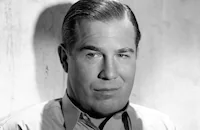To the delight of Wheeler and Woolsey fans and the dismay of Gershwin purists, this RKO film version of the 1930 George and Ira Gershwin stage musical put the emphasis on comedy and gave short shrift to the much-admired score. Only three of the original Gershwin songs remain: "Bidin' My Time," used as background music for an opening sequence in which the camera pans past the tombstones of the unlucky former sheriffs; "I Got Rhythm," performed by Kelly in the style that had made Ethel Merman a sensation in the number on Broadway; and "But Not for Me," sung by Quillan and Judge and then parodied by Green, who also offers impressions of Bing Crosby, George Arliss and Edna May Oliver. A fourth number, "You've Got What Gets Me," was borrowed from the Gershwin's 1927 stage production Funny Face and is sung winningly by Wheeler and his frequent screen partner, Dorothy Lee.
Wheeler and Woolsey were first teamed as comic partners by Florenz Ziegfeld in the Broadway musical Rio Rita. After repeating their roles in the 1929 film version of that stage hit, they remained a popular team in a series of comedy features and shorts that continued until Woolsey's death in 1938. Their other films together include Hold 'Em Jail (1932), So This is Africa (1933) and The Nitwits (1935). Their version of Girl Crazy was unseen for many years because of MGM's 1943 Judy Garland/Mickey Rooney remake, in which the musical numbers again take the spotlight. Busby Berkeley, who served without screen credit as choreographer of the 1932 version, would take over as director of the Garland-Rooney film.
Producers: William LeBaron, David O. Selznick (Executive Producer)
Director: William A. Seiter
Screenplay: Walter DeLeon, Herman J. Mankiewicz, Eddie Welch, Tim Whelan, from play by Guy Bolton and Jack McGowan
Cinematography: J. Roy Hunt
Editing: Arthur Roberts
Original Music: George Gershwin, Ira Gershwin
Choreographer: Busby Berkeley (uncredited)
Cast: Bert Wheeler (Jimmy Deagan), Robert Woolsey (Slick Foster), Eddie Quillan (Danny Churchill), Dorothy Lee (Patsy), Mitzi Green (Tessie), Kitty Kelly (Kate Foster).
BW-75m. Closed Captioning.
by Roger Fristoe
























